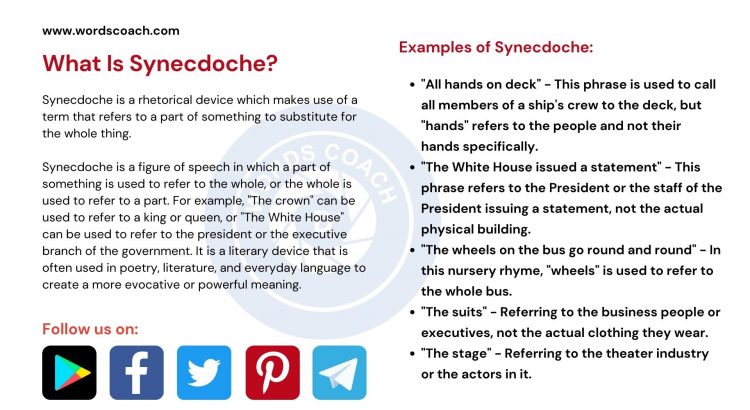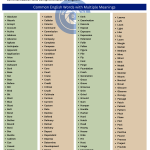What Is Synecdoche?
Synecdoche is a rhetorical device which makes use of a term that refers to a part of something to substitute for the whole thing.
Synecdoche is a figure of speech in which a part of something is used to refer to the whole, or the whole is used to refer to a part. For example, “The crown” can be used to refer to a king or queen, or “The White House” can be used to refer to the president or the executive branch of the government. It is a literary device that is often used in poetry, literature, and everyday language to create a more evocative or powerful meaning.
How Does Synecdoche Differ from Metonymy?
| Synecdoche | Metonymy |
| A figure of speech in which a part of something is used to refer to the whole thing. | A figure of speech in which a term (an object or an idea) is substituted by another term that is closely related to it. |
| For example: We are planning to hire some more hands. | For example: It would be easier if you could give a hand. |
Examples of Synecdoche
Here are a few examples of synecdoche in literature and everyday language:
- “All hands on deck” – This phrase is used to call all members of a ship’s crew to the deck, but “hands” refers to the people and not their hands specifically.
- “The White House issued a statement” – This phrase refers to the President or the staff of the President issuing a statement, not the actual physical building.
- “The wheels on the bus go round and round” – In this nursery rhyme, “wheels” is used to refer to the whole bus.
- “The suits” – Referring to the business people or executives, not the actual clothing they wear.
- “The stage” – Referring to the theater industry or the actors in it.
- “The pen is mightier than the sword” – In this phrase, “pen” is used to refer to the power of writing or words, not the physical writing instrument.
- “The suits in Wall Street” – Referring to the financial industry or the people working in it.
These are just a few examples of how synecdoche can be used to create a more evocative or powerful meaning, by using a part of something to refer to the whole, or the whole to refer to a part.






